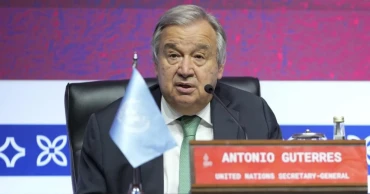U.N. Secretary-General
UN forecasts fall in global economic growth to 1.9% in 2023
The United Nations forecast Wednesday (January 25, 2023) that global economic growth will fall significantly to 1.9% this year as a result of the food and energy crisis sparked by the war in Ukraine, the ongoing impact of the COVID-19 pandemic, persistently high inflation and the climate emergency.
Painting a gloomy and uncertain economic outlook, the U.N. Department of Economic and Social Affairs said the current global economic slowdown “cuts across both developed and developing countries, with many facing risks of recession in 2023.”
“A broad-based and severe slowdown of the global economy looms large amid high inflation, aggressive monetary tightening, and heightened uncertainties,” U.N. Secretary-General Antonio Guterres said in a foreword to the 178-page report.
The report said this year's 1.9% economic growth forecast — down from an estimated 3% in 2022 — is one of the lowest growth rates in recent decades. But it projects a moderate pick-up to 2.7% in 2024 if inflation gradually abates and economic headwinds start to subside.
Read More: Global economic growth will slow down in 2023, but will pick up in 2024: IMF chief
In its annual report earlier this month, the World Bank which lends money to poorer countries for development projects, cut its growth forecast nearly in half, from it previous projection of 3% to just 1.7%.
The International Monetary Fund, which provides loans to needy countries, projected in October that global growth would slow from 6% in 2021 to 3.2% in 2022 and 2.7% in 2023. IMF Managing Director Kristalina Georgieva said at last week’s World Economic Forum in Davos that 2023 will be a difficult year, but stuck by the projection and said “we don’t expect a global recession.”
Shantanu Mukherjee, director of the economic analysis and policy division of the U.N. Department of Economic and Social Affairs, highlighted the growing income inequality in the world at a news conference launching the report.
Between 2019 and 2021, he said, average incomes for the top 10% rose by 1.2% while the incomes of the lowest 40% fell by 0.5%.
Read More: Bangladesh-Turkiye Business Forum launched to usher in new era of economic cooperation
“The top 10% now earns on average over 42 times what the lowest percentiles” earn, Mukherjee said.
According to the U.N. report, this year “growth momentum has weakened in the United States, the European Union and other developed economies, adversely affecting the rest of the world economy.”
In the United States, GDP is projected to expand by only 0.4% in 2023 after estimated growth of 1.8% in 2022, the U.N. said. And many European countries are projected to experience “a mild recession" with the war in Ukraine heading into its second year on Feb. 14, high energy costs, and inflation and tighter financial conditions depressing household consumption and investment.
The economies in the 27-nation European Union are forecast to grow by just 0.2% in 2023, down from an estimated 3.3% in 2022, the U.N. said. And in the United Kingdom, which left the EU three years ago, GDP is projected to contract by 0.8% in 2023, continuing a recession that began in the second half of 2022, it said.
Read More: China’s economic growth falls to second-lowest level in four decades
With China’s government abandoning its zero-COVID policy late last year and easing monetary and fiscal policies, the U.N. forecast that its economy, which expanded by only 3% in 2022, will accelerate to 4.8% this year.
“But the reopening of the economy is expected to be bumpy,” the U.N. said. ”Growth will likely remain well below the pre-pandemic rate of 6-6.5%.”
The U.N. report said Japan’s economy is expected to be among the better-performing among developed countries this year, with GDP forecast to increase by 1.5%, slightly lower than last year’s estimated growth of 1.6%.
Across east Asia, the U.N. said economic recovery remains fragile though GDP growth in 2023 is forecast to reach 4.4%, up from 3.2% last year, and stronger than in other regions.
Read More: AL govt's ouster a 'must' to tackle political, economic crises
In South Asia, the U.N. forecast average GDP growth will slow from 5.6% last year to 4.8% this year as a result of high food and energy prices, “monetary tightening and fiscal vulnerabilities.”
But growth in India, which is expected to overtake China this year as the world’s most populous nation, is expected to remain strong at 5.8%, slightly lower than the estimated 6.4% in 2022, “as higher interest rates and a global slowdown weigh on investments and exports,” the U.N. report said.
In Western Asia, oil-producing countries are benefiting from high prices and rising output as well as a revival in tourism, the U.N. said. But economies that aren’t oil producers remain weak “given tightening access to international finance and severe fiscal constraints,” and average growth in the region is projected to slow from an estimated 6.4% in 2022 to 3.5% this year.
The U.N. said Africa has been hit “by multiple shocks, including weaker demand from key trading partners (especially China and Europe), a sharp increase in energy and food prices, rapidly rising borrowing costs and adverse weather events.”
Read More: Burden of Bangladesh’s economic and political stability must be shared
One result, it said, is mounting debt-servicing burdens which have forced a growing number of African governments to seek bilateral and multilateral support.
The U.N. projected economic growth in Africa to slow from an estimated 4.1% in 2022 to 3.8% this year.
In Latin America and the Caribbean, the U.N. said the outlook “remains challenging,” citing labor market prospects, stubbornly high inflation and other issues. It forecast that regional growth will slow to just 1.4% in 2023 from an estimated expansion of 3.8% in 2022.
“The region’s largest economies – Argentina, Brazil and Mexico – are expected to grow at very low rates due to tightening financial conditions, weakening exports, and domestic vulnerabilities,” the U.N. said.
Read More: Bangladesh considering ‘pros and cons’ of Indo-Pacific Economic Framework: Momen
For the world’s least developed countries, the U.N. said growth is projected at 4.4% this year, about the same as last year but significantly below the UN's target of 7% by 2030.
3 years ago
North Korea calls UN's Guterres 'puppet of US' after launch
North Korea’s foreign minister called U.N. Secretary-General Antonio Guterres “a puppet of the United States” as she slammed the U.N. chief for joining U.S.-led condemnation of the North's recent intercontinental ballistic missile test.
U.N. Secretary-General Antonio Guterres earlier issued a statement strongly condemning North Korea’s ICBM launch on Friday and reiterating his call on the North to “to immediately desist from taking any further provocative actions.” Guterres’s statement came after the United States and other countries issued similar criticism of the North's ICBM test that showed an potential to strike anywhere in the continental U.S.
“I often take the U.N. secretary-general for a member of the U.S. White House or its State Department,” North Korean Foreign Minister Choe Son Hui said in a statement carried by state media. “I express my strong regret over the fact that the U.N. secretary-general has taken a very deplorable attitude, oblivious of the purpose and principles of the U.N. Charter and its proper mission which is to maintain impartiality, objectivity and equity in all matters.”
Read more: Missile tests practiced to attack South, US: North Korea
Choe accused Guterres of overlooking the U.S. and its allies taking the North’s ICBM test to the U.N. Security Council, saying that “This clearly proves that he is a puppet of the U.S.”
The U.N. Security Council scheduled an emergency meeting for Monday morning on North Korea’s ICBM launch at Japan’s request. But it’s unclear if it can impose new economic sanctions on North Korea because China and Russia, two of the council’s veto-wielding members, have opposed the previous U.S. and its allies’ moves to toughen sanctions on the North over its banned tests of ballistic missiles earlier this year.
On Sunday, top diplomats from the world’s major industrialized democracies issued a joint statement calling for strong steps by the U.N. Security Council in reaction to the North Korean missile launch. “(North Korea’s) actions demand a united and robust response by the international community, including the need for further significant measures to be taken by the U.N. Security Council,” said the statement by foreign ministers from the Group of Seven nations — Canada, France, Germany, Italy, Japan, the United Kingdom and the United States.
Friday’s ICBM launch was the latest in North Korea’s ongoing torrid run of missile tests that experts say are meant to boost its nuclear capability and increase its leverage in future diplomacy.
North Korea said leader Kim Jong Un observed Friday's launch of its Hwasong-17 missile and called it another "reliable and maximum-capacity” weapon to contain U.S. military threats. Some experts say the Hwasong-17 is still under development but it's the North's longest-range missile and is designed to carry several nuclear warheads to overcome U.S. missile defense systems.
Read more: North Korea continues its bombardment of missiles with a potential ICBM
North Korea has argued its testing activities are a warning to the United States and South Korea over their series of military drills that the North believes were an invasion rehearsal. Washington and Seoul have maintained their exercises are defensive in nature.
In her statement Monday, Choe again defended her country’s missile tests, calling them “legitimate and just exercise of the right to self-defense” against “provocative nuclear war rehearsals” by the United States and its allies. She said it’s “most amazing and deplorable to me” as Guterres still blamed North Korea for a recent flare-up in tensions on the Korean Peninsula, not the United States.
A day before her country’s ICBM test, Choe threatened to threatened to launch “fiercer” military responses to steps by the U.S. to bolster its security commitment to South Korea and Japan.
3 years ago
UN chief warns planet is heading toward `climate chaos'
U.N. Secretary-General Antonio Guterres warned Thursday that the planet is heading toward irreversible “climate chaos” and urged global leaders at the upcoming climate summit in Egypt to put the world back on track to cut emissions, keep promises on climate financing and help developing countries speed their transition to renewable energy.
The U.N. chief said the 27th annual Conference of the 198 Parties of the U.N. Framework Convention on Climate Change — better known as COP27 — “must be the place to rebuild trust and re-establish the ambition needed to avoid driving our planet over the climate cliff.”
He said the most important outcome of COP27, which begins Nov. 6 in the Egyptian resort of Sharm el-Sheikh, is to have “a clear political will to reduce emissions faster.”
That requires a historical pact between richer developed countries and emerging economies, Guterres said. “And if that pact doesn’t take place, we will be doomed.”
In the pact, the secretary-general said, wealthier countries must provide financial and technical assistance – along with support from multilateral development banks and technology companies – to help emerging economies speed their renewable energy transition.
Guterres said that in the last few weeks, reports have painted “a clear and bleak picture” of global-warming greenhouse gas emissions still growing at record levels instead of going down 45% by 2030 as scientists say must happen.
The landmark Paris agreement adopted in 2015 to address climate change called for global temperatures to rise a maximum of 2 degrees Celsius (3.6 degrees Fahrenheit) by the end of the century compared to pre-industrial times, and as close as possible to 1.5 degrees Celsius (2.7 degrees Fahrenheit).
Guterres said greenhouse gas emissions are now on course to rise by 10%, and temperatures are on course to rise by as much as 2.8 degrees Celsius under present policies by the end of the century.
Read more: Climate Change: Int’l community must act with fund and solutions to help most vulnerable nations
“And that means our planet is on course for reaching tipping points that will make climate chaos irreversible and forever bake in catastrophic temperature rise,” the secretary-general warned.
He said the 1.5 degree goal “is in intensive care” and “in high danger,” but it’s still possible to meet it. “And my objective in Egypt is to make sure that we gather enough political will to make this possibility really moving forward,” the U.N. chief said.
“COP27 must be the place to close the ambition gap, the credibility gap and the solidarity gap,” Guterres said. “It must put us back on track to cutting emissions, boosting climate resilience and adaptation, keeping the promise on climate finance and addressing loss and damage from climate change.”
Rich countries, especially the United States, have emitted far more than their share of heat-trapping carbon dioxide from the burning of coal, oil and natural gas, data shows. Poor nations like Pakistan, where recent floods left a third of the country under water, have been hurt far more than their share of global carbon emissions.
Loss and damage has been talked about for years, but richer nations have often balked at negotiating details about paying for past climate disasters, like Pakistan’s flooding this summer.
“Loss and damage have been the always-postponed issue,” Guterres said. “There is no more time to postpone it. We must recognize loss and damage and we must create an institutional framework to deal with it.”
Read more: UN, ADB to support Bangladesh's fight against climate change
The secretary-general said Thursday that “getting concrete results on loss and damage is the litmus test of the commitment of the governments to close all of these gaps.”
“COP27 must lay the foundations for much faster, bolder climate action now and in this crucial decade, when the global climate fight will be won or lost,” Guterres said.
3 years ago
Pope to UN forum: Hunger is 'crime' violating basic rights
Pope Francis on Monday decried as criminal the existence of hunger in a world which can produce enough food for all, building on a warning from the chief of the United Nations that climate change and conflict are both a consequence and a driver of poverty and income inequality.
Earlier in the day, U.N. Secretary-General Antonio Guterres told a meeting in Rome via video message that the world’s food system generates a third of all greenhouse gas emissions. That same system is responsible for as much as 80% of biodiversity loss, he lamented in a video message.
The gathering was called to help prepare for a U.N. food systems summit to be held in September in New York.
In a written message that was read to meeting participants, Francis said the coronavirus ppandemic has “confronted us with the systemic injustices that undermine our unity as a human family.”
He said the the world’s poorest people and the planet are crying out because of “the damage we inflict on it through irresponsible use and abuse of the goods God has placed in it.”
READ: Pope decries shame of racism, like ‘virus’ lurking in wait
The pontiff added that while new technologies are developed to increase the capacity to produce food on Earth, people continue to “exploit nature to the point of sterilization, thus expanding not only external deserts but also internal spiritual deserts.“
Francis called the “scandal” of hunger a ”crime that violates basic human rights.”
Earlier this month, a U.N. report noted that up to 161 million more people faced hunger last year compared to 2019, with much of that widened suffering likely linked to the COVID-19 pandemic.
“Poverty, income inequality and the high cost of food continue to keep healthy diets out of the reach of some 3 billion people,″ Guterres said. ”Climate change and conflict are both consequences and drivers of this catastrophe.”
The summit idea was launched in 2019 months before the coronavirus emerged, but Italian Premier Mario Draghi said the pandemic made existing threats to food security more urgent.
Draghi noted in his remarks Monday that the Agricultural Commodity Price Index had jumped by 30% compared to January 2020.
The International Fund for Agricultural Development called on decision-makers “to address the failures in food systems” that leave hundreds of millions of people poor and hungry. IFAD is a U.N. agency which aims to help small-scale farming.
IFAD appealed for food production which “protects the environment and biodiversity, and where people who produce our food are paid decently for their labor.”
In 2020, as many as 811 million people faced hunger, according to the U.N. report earlier this month.
READ: Pope visits Iraq's war-ravaged north on last day of tour
The chief economist of the Rome-based U.N. Food and Agriculture Organization has said that removing 100 million people from chronic undernourishment would need an additional $14 billion (nearly 12 billion euros) every year until 2030 and nearly triple that amount to achieve the U.N. goal of zero hunger by 2030.
4 years ago
Myanmar protesters defy curfew; media outlets ordered shut
Demonstrators in Myanmar’s biggest city came out Monday night for their first mass protests in defiance of an 8 p.m. curfew, seeking to show support for an estimated 200 students trapped by security forces in a small area of one neighborhood.
4 years ago
UN rights body trains spotlight on Myanmar following coup
The UN’s top human rights body held an urgent session on Friday to discuss the military coup in Myanmar, facing a call for the release of people “arbitrarily detained” — including civilian government leader Aung San Suu Kyi — and more action by UN officials to increase scrutiny of the country.
5 years ago
Myanmar lawmakers say army guarding their housing after coup
Hundreds of members of Myanmar’s Parliament remained confined inside their government housing in the country’s capital on Tuesday, a day after the military staged a coup and detained senior politicians including Nobel laureate and de facto leader Aung San Suu Kyi.
5 years ago
UN chief: World faces 'existential threats,' fragilities
U.N. Secretary-General Antonio Guterres warned global leaders Monday that the world is not only facing a COVID-19 emergency and the worst economic crisis in nearly a century, but also “existential threats" to the climate and biodiversity — and the possibility of the largest economies, the United States and China, splitting the world in two.
5 years ago



.jpg)
.jpg)
.jpg)
.jpg)




